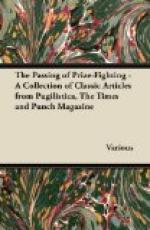* * * * *
“After doing a few rounds of the field a wha he ‘naives’ call a errific speed, he calf leaped a high wall inoa nohehr field, and, followed by a number of men, made sraigh for he cliffs. Fearing nohing, he animal jumped from the cliff.”—Daily Dispatch.
It is conjectured that the unfortunate animal was missing its “t.”
* * * * *
“Wanted Plain Dressmaker,
who goes out daily, for altering and
re-making.”—Irish
Paper.
After a few days of this process she may hope to be a plain dressmaker no longer.
* * * * *
[Illustration: Mistress (to under-gardener, who has been up to be examined for the Army). “I SUPPOSE, JOHN, YOU TOLD THEM YOU WOULD NOT BE EIGHTEEN UNTIL THE END OF THE MONTH?”
John. “NO USE, MUM. YOU ONLY GETS CHEEK UP THERE IF YOU SAYS ANYTHING.”]
* * * * *
OUR BOOKING-OFFICE.
(BY MR. PUNCH’S STAFF OF LEARNED CLERKS.)
The Candid Courtship (LANE) is a story full of good talk; by which I do not at all mean brilliant epigram and verbal fireworks, but direct and genuine conversation, just so far manipulated by the author that it advances the business in hand without becoming artificial. I must add, however, that Miss MADGE MEARS occasionally displays the defects of her qualities, to the extent of sacrificing syntax to ease, even in passages of pure narrative, with results that might offend the precisionist. But after all it is what she has to say that matters most; and the story of The Candid Courtship will hold you amused and curious to the end. I will not spoil it by re-telling, save to indicate that (as the title implies) it is about a suitor who, in proposing to the girl of his choice, confessed to her that he had a past. Not a very lurid past, but quite bad enough for the G.O.H.C., who happened to entertain strong views on sex-equality. So, as vulgar persons say, the fat was in the fire—more especially when the lady of the past turned up again, not past at all, but very pleasantly intriguing with another, and that other own brother to the girl herself. A pretty complication, and leading up to an admirable scene of tragi-comedy over a double elopement and a pursuit, which you must certainly read. Do not, however, be led to think that the story is at all farcically treated; Miss MEARS is far too serious an artist to neglect the graver aspects of her theme. Briefly, an excellently human and stimulating novel, whose only drawback is that recent events have caused the suffrage atmosphere in which it is sat to taste somewhat stale.
* * * * *




